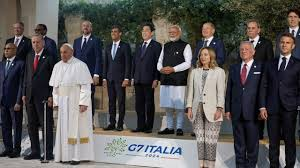Rising Power, Rising Responsibilities: Five Geopolitical Challenges for Modi 3.0

19.06.2024: As Prime Minister Narendra Modi begins his third term, India stands at a crucial juncture in its global journey. The NDA government must navigate a complex international landscape, significantly different from 2014 and 2019. India’s growing global influence must focus on leveraging international opportunities to enhance domestic prosperity and equity. Here are five key geopolitical challenges that will shape India’s engagement with the world under Modi 3.0.
1. The Return of Great-Power Rivalry
The resurgence of great-power rivalry demands a pragmatic approach driven by national interests rather than ideology. The renewed conflict between the West and China-Russia has created a vastly different set of external conditions for India’s international relations. Unlike the post-Cold War era of 1991, where India could engage freely with all major powers, today’s geopolitical climate requires careful balancing and strategic alliances.
2. Adapting to Structural Changes in the International System
Deep structural changes are unfolding globally, necessitating significant adjustments in India’s worldview and domestic policies. The rise of multipolarity, shifts in economic power, and evolving security dynamics demand that India remain agile and proactive. Adapting to these changes is crucial for maintaining and enhancing India’s global standing.
3. Enhancing Domestic Prosperity through Global Leverage
India’s expanding global influence should be directed towards boosting domestic prosperity and equity. Leveraging international partnerships, investments, and technological advancements can drive rapid economic growth and development at home. This approach ensures that India’s global ambitions translate into tangible benefits for its population.
4. Navigating Complex Regional Dynamics
India must adeptly navigate the complex dynamics of its immediate neighborhood and the broader Asian region. The rise of China as a dominant regional power, ongoing tensions with Pakistan, and evolving relationships with other South Asian nations require a nuanced and strategic approach. Strengthening regional ties while safeguarding national interests will be a delicate balancing act.
5. Addressing Global Issues and Responsibilities
As a rising power, India must take on greater responsibilities in addressing global challenges such as climate change, cybersecurity, and international trade. Active participation in global forums and contributing to the resolution of transnational issues will enhance India’s role as a responsible global actor. This proactive stance will also bolster India’s international credibility and leadership.
India’s journey under Modi 3.0 will be shaped by these geopolitical challenges and opportunities. By adopting a pragmatic, interest-driven approach, adapting to global structural changes, leveraging international influence for domestic growth, navigating regional complexities, and addressing global responsibilities, India can strengthen its global position. The NDA government’s success in these areas will determine the extent to which India can harness its rising power for the benefit of its people and the world.
